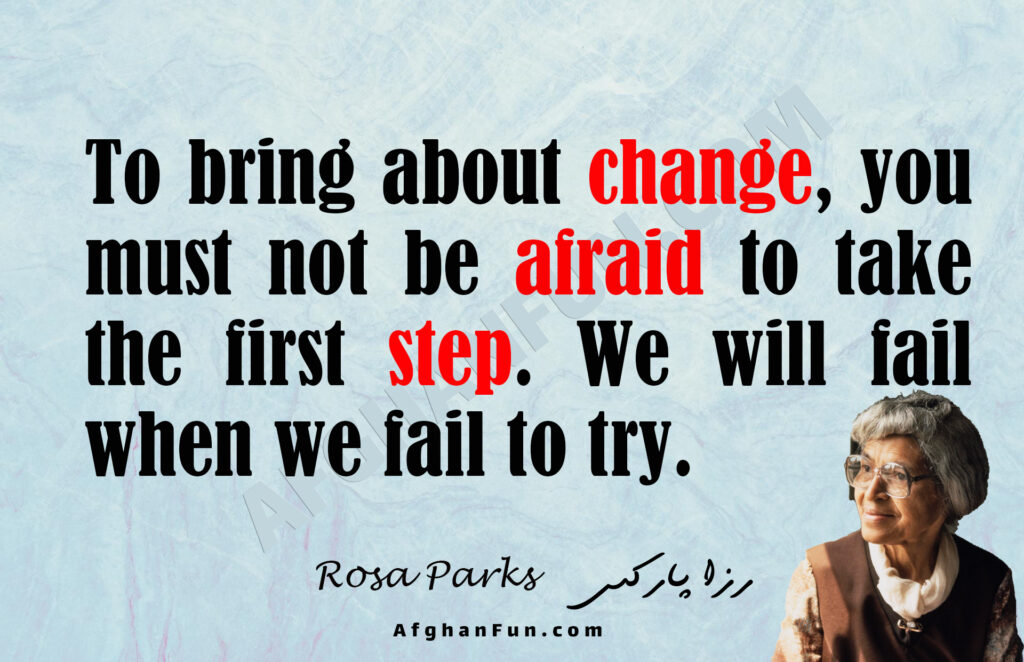Rosa Parks: Fearless First Steps are Key to Change

To bring about change, you must not be afraid to take the first step. We will fail when we fail to try.
Rosa Parks
Take the Leap: Rosa Parks on the Necessity of Action
برای ایجاد تغییر، نباید از برداشتن اولین گام ترسید. ما زمانی شکست میخوریم که تلاش نکنیم.
رزا پارکس
این جمله به ما یادآور میشود که برای ایجاد هرگونه تغییر مثبت در زندگی، باید قدم اول را برداریم. ترس از شکست نباید مانع از تلاش ما شود. در واقع، بزرگترین شکست این است که اصلاً تلاش نکنیم. این نقل قول به ما انگیزه میدهد تا از منطقه امن خود خارج شویم و برای رسیدن به اهدافمان تلاش کنیم.
Don’t Fear the First Step: Rosa Parks’ Call to Courage
Барои эҷоди тағйир, набояд аз бардоштани қадами аввал тарсид. Мо вақте шикаст мехӯрем, ки кӯшиш накунем.
Роза Паркс
Ин ибора ба мо хотиррасон мекунад, ки барои ба вуҷуд овардани ҳар гуна тағйироти мусбат дар ҳаёт, бояд қадами аввалро бардорем. Тарси нокомӣ набояд монеи кӯшиши мо гардад. Дар асл, бузургтарин нокомӣ ин аст, ки умуман кӯшиш накунем. Ин ибора ба мо ангеза медиҳад, ки аз минтақаи амни худ берун шавем ва барои расидан ба ҳадафҳоямон кӯшиш кунем.
Rosa Parks: Change Starts with a Single, Bold Move
لإحداث التغيير، لا يجب أن نخاف من اتخاذ الخطوة الأولى. نحن نفشل فقط عندما لا نحاول.
روزا باركس
تقول هذه العبارة لنا أنه من أجل إحداث أي تغيير إيجابي في الحياة، يجب أن نخطو الخطوة الأولى. لا يجب أن يخيفنا الخوف من الفشل من بذل الجهد. في الواقع، أكبر فشل هو عدم المحاولة على الإطلاق. تشجعنا هذه العبارة على الخروج من منطقتنا الآمنة والسعي لتحقيق أهدافنا.
Don’t Let Fear Stop You: Rosa Parks on the Importance of Trying
Rosa Parks’ quote, “To bring about change, you must not be afraid to take the first step. We will fail when we fail to try,” is a powerful statement on the importance of courage, initiative, and persistence in the face of adversity. Let’s break it down and explore its deeper meaning:
1. “To bring about change, you must not be afraid to take the first step.”
Courage to Act: The first part of the quote emphasizes the essential role of courage in initiating change. In order to make a difference, one must be willing to step out of their comfort zone and take the first action, no matter how daunting it may seem. The “first step” is often the most difficult part of any journey, as it requires overcoming fear, doubt, or hesitation.
Symbolism of the First Step: Parks herself became a symbol of courage when she refused to give up her seat on a segregated bus in Montgomery, Alabama, in 1955. Her single, deliberate act of defiance sparked the Civil Rights Movement, showing how a single step can initiate massive change. This moment demonstrates that one person’s decision to act can challenge oppressive systems and inspire collective movements.
The Importance of Initiative: Change rarely happens without someone deciding to take action. Rosa Parks’ refusal was not just a personal act of defiance, but an intentional step in the broader struggle for racial justice. She understood that in order to challenge the status quo, you have to begin somewhere, and sometimes that means being the first to speak, act, or refuse to accept injustice.
2. “We will fail when we fail to try.”
Failure as Inaction: The second part of the quote highlights the inherent risk of inaction. Parks is asserting that failing to act is the ultimate form of failure. In her context, this refers to the broader society’s failure to confront racial injustice, and the personal failure of individuals to challenge systems of oppression. By not attempting to change the status quo, people inadvertently perpetuate it.
The Power of Trying: The idea that trying is more important than simply succeeding or failing is a significant one. Parks is not just advocating for success but for the act of engaging in the struggle itself. She understood that without the willingness to try, no progress can be made. Even if the outcome isn’t immediately victorious, the effort itself is a form of resistance and a necessary part of bringing about change.
The Danger of Complacency: The statement also serves as a warning against complacency or fear of failure. If we fail to act because we’re afraid of making a mistake or facing consequences, we miss the opportunity to bring about the very change we seek. Parks herself faced harsh consequences—she was arrested, lost her job, and faced public backlash—but her willingness to try, despite the risks, made all the difference in the fight for civil rights.
3. The Broader Context of the Quote:
Rosa Parks’ Life and Legacy: Rosa Parks’ quiet, yet defiant act on the bus is often seen as a pivotal moment in the Civil Rights Movement. However, it’s important to note that her refusal to give up her seat was not an isolated incident. Parks had been actively involved in civil rights work long before that day. Her act of defiance was not just spontaneous; it was a deliberate step in a lifelong commitment to justice. She understood that true change requires persistent effort, even if that means taking risks or facing failure.
Inspiration for Collective Action: While Parks’ action is often celebrated as a singular moment of resistance, it also highlights how individual efforts can spark a collective response. The Montgomery Bus Boycott that followed her arrest, led by figures like Dr. Martin Luther King Jr., demonstrated that one person’s courage could galvanize a community into action. This reinforces the idea that the “first step” is not just an individual act, but a potential catalyst for a larger movement.
4. Philosophical Implications:
Taking Risks for a Greater Cause: Parks’ quote embodies a deep sense of commitment to justice. It suggests that to bring about change, one must be willing to face the unknown, take risks, and be prepared for both success and failure. The willingness to take action, even with uncertain outcomes, is fundamental to achieving meaningful change in society. In many ways, this echoes the idea that personal sacrifice or discomfort can be a necessary component of social progress.
Change as a Collective Process: Parks also indirectly acknowledges the role of community in change. While the individual must take the first step, change is rarely achieved by one person alone. Her words can be interpreted as a call to others to join in the effort, to not be paralyzed by fear of failure, but to act together to achieve something greater than individual efforts alone.
5. Relevance Today:
Call to Action in Modern Movements: The message of Rosa Parks’ quote is just as relevant today in various social, political, and environmental movements. Whether advocating for racial equality, climate action, gender rights, or economic justice, her words continue to inspire individuals to take action despite uncertainty or fear. In many ways, it serves as a reminder that significant societal change begins with individual decisions to resist the status quo.
Breaking Down Barriers: In today’s world, many people may feel that their individual actions cannot lead to meaningful change, but Parks’ quote reminds us that change often starts with the courage to take that first step. Whether it’s speaking out against injustice, challenging discrimination, or simply standing up for what is right, the first step is often the hardest, but it is essential for progress.
Conclusion:
Rosa Parks’ quote is a timeless reminder that change begins with individual courage and the willingness to act. “Taking the first step” involves overcoming fear and doubt, and it can sometimes feel like a small or inconsequential act. However, Parks’ life and her words teach us that these steps, when taken with conviction, can ignite movements, challenge oppressive systems, and pave the way for larger societal shifts. Her message is clear: do not be afraid to try, because without action, there is no possibility for change.
Rosa Parks was a pivotal figure in the American civil rights movement, best known for her courageous act of defiance on December 1, 1955, when she refused to give up her bus seat to a white passenger in Montgomery, Alabama. This act of resistance became a catalyst for the Montgomery Bus Boycott, a significant event that highlighted racial segregation and injustice in the United States.
Early Life
Rosa Louise McCauley was born on February 4, 1913, in Tuskegee, Alabama. She grew up in a segregated society and faced the harsh realities of racial discrimination from a young age. Her mother, Leona, was a teacher, and her father, James, was a carpenter. Rosa attended segregated schools and graduated from Booker T. Washington High School. She later attended Alabama State College, where she developed a passion for social justice.
Involvement in the Civil Rights Movement
Parks joined the Montgomery chapter of the NAACP (National Association for the Advancement of Colored People) in 1943 and became actively involved in civil rights issues. She served as the chapter’s secretary and worked on various initiatives, including investigating cases of racial injustice.
The Montgomery Bus Boycott
On December 1, 1955, after a long day at work, Parks boarded a bus and took a seat in the “colored” section. When a white man boarded and the bus driver asked Parks to give up her seat, she refused, stating, “I didn’t want to be treated like a second-class citizen.” Her arrest for this act of defiance sparked outrage in the African American community and led to the Montgomery Bus Boycott, which lasted for 381 days. The boycott was organized by civil rights leaders, including Martin Luther King Jr., and aimed to challenge the bus segregation laws.
Legacy and Later Life
The boycott ultimately led to a Supreme Court ruling in 1956 that declared segregation on public buses unconstitutional. Parks became an international symbol of the fight against racial injustice. She continued her activism, speaking out for civil rights and working alongside other leaders in the movement.
In 1965, Parks moved to Detroit, Michigan, where she continued to advocate for civil rights and social justice. She worked as a secretary and later as a staff member for U.S. Congressman John Conyers. Throughout her life, she received numerous awards and honors, including the Martin Luther King Jr. Award, the NAACP’s Spingarn Medal, and the Presidential Medal of Freedom in 1996.
Death and Commemoration
Rosa Parks passed away on October 24, 2005, at the age of 92. Her legacy continues to inspire generations. In 2013, she was honored with a statue in the U.S. Capitol, becoming the first woman of the civil rights movement to receive such recognition. Parks is often referred to as “the mother of the civil rights movement,” and her contributions to the struggle for equality remain a vital part of American history.
Conclusion
Rosa Parks’ courageous act of defiance and her lifelong commitment to justice have made her an enduring icon of the civil rights movement. Her legacy serves as a reminder of the power of individual action and the ongoing struggle for equality and justice in society.
External links:











